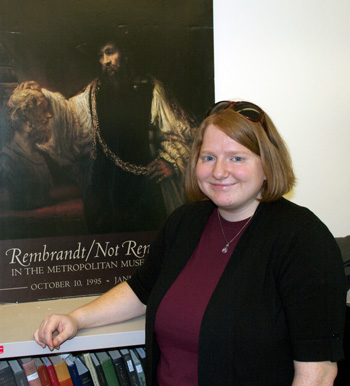Sarah DePuy
We in the department know Sarah as a superb classics major, but she also majored in anthropology, and minored in museum studies, art history, and Native American studies. “They all just happened and fell in together.”
“I always read classical myths as a kid. My mom was a teacher so she’d always bring home things, and I really loved mythology. My parents took Latin so I took it too, and I had a wonderful teacher. We did all sorts of fun things; we had Rome on the ceiling, little buildings and the Tiber River that we put on the ceiling.”
“Then when I came SIU Latin was the language I knew the most, so I decided to continue with it, and I liked Latin and it was fun. I started it because I need to fulfill the language requirement but it was fun so I kept doing it. Once you get to the advanced classes and you start looking at texts it gets more fun and more interesting. I really liked Ovid, because we were reading the different stories which we weird and interesting and wonderful. So when we were looking at the Pygmalion version it was very different from the version I’d read as a kid. In the version I read Pygmalion was a king who didn’t want to get married and made a statue; he said that he wouldn’t marry a bride unless she was more beautiful than the statue. In Ovid it’s really different, not so much of a fairly tale. So I wondered what I had read was all about—what liberties they had taken.”
“The same thing kind of happened with Catullus—we read some in high school, but we read different ones here. He’s not just a romantic emotional wreck, but satirical and laughing at everybody else. It was a different Catullus than the one I knew.”
“I think my favorite classes were ones about stories—classical myth, classical themes. The myth class introduced to new myths, including those from the NE and Egypt.”
Why read texts in the original? “I like reading things in translation, since I can get through it all quickly, but translating texts is more fun; you’re doing it in a group, which means you end up talking about what it means together all along. Sometimes the original language isn’t clear—different interpretations are possible. You don’t have rely on other people’s opinion; you get to figure out things for yourself.”
What does Sarah like most about SIU? “I think it’s got a lot diversity. From my experience professors are not afraid to challenge students and to offer new courses and to shape 
Sarah worked as a tutor for SIU, getting paid to help her classmates. “There are a lot of opportunities to do that, if you get good grades. I learned even more about studying; it kind of fleshed out everything I knew about studying. I had to get my own work done first, so I could help out other kids, and the sooner I got things done, the more I could help others students. It kept me focused.”
Any advice for potential students? “Don’t slack off, especially your first semester. If you’re not that interested in academics, keep in mind that your classes have lots to do with your life—anthropology teaches you that. One student in my anthropology class did his senior seminar on bar culture. He did anthropological research on bars; he did interviews, he studied space usage in bars—he wants to own a bar when he grows up. It’s interesting to think of it as a dynamic urban space for academic inquiry.
“This may not seem so obvious with Classics, but there are lots of different movies inspired by classics, like Brother Where Art Thou and Minority Report.”
Sarah is now off to a MA program in Museum Studies at Eastern Illinois University, where she’ll no doubt continue to follow her various interests.
